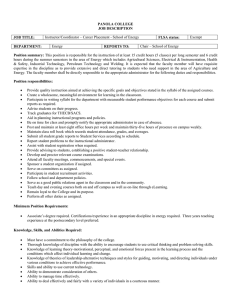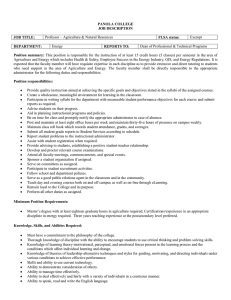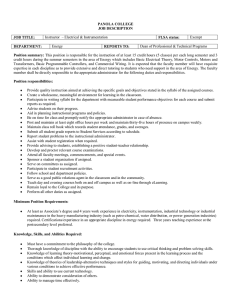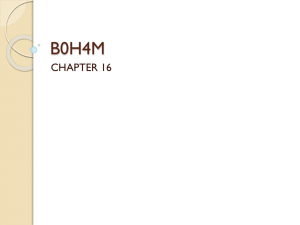POLICY
advertisement
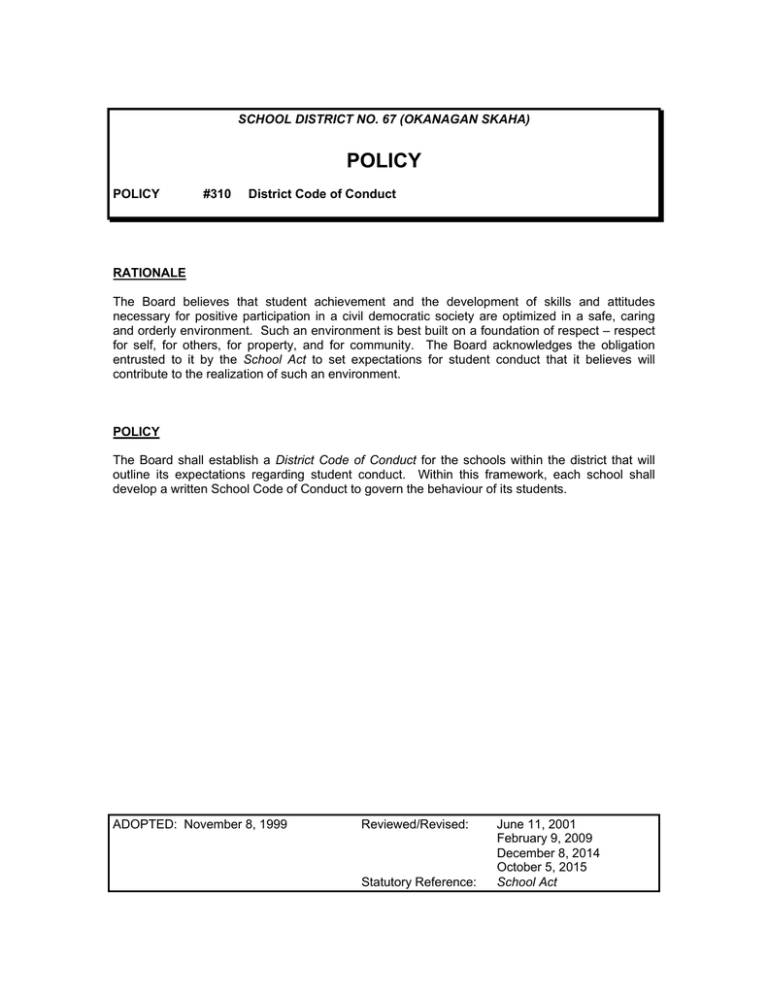
SCHOOL DISTRICT NO. 67 (OKANAGAN SKAHA) POLICY POLICY #310 District Code of Conduct RATIONALE The Board believes that student achievement and the development of skills and attitudes necessary for positive participation in a civil democratic society are optimized in a safe, caring and orderly environment. Such an environment is best built on a foundation of respect – respect for self, for others, for property, and for community. The Board acknowledges the obligation entrusted to it by the School Act to set expectations for student conduct that it believes will contribute to the realization of such an environment. POLICY The Board shall establish a District Code of Conduct for the schools within the district that will outline its expectations regarding student conduct. Within this framework, each school shall develop a written School Code of Conduct to govern the behaviour of its students. ADOPTED: November 8, 1999 Reviewed/Revised: Statutory Reference: June 11, 2001 February 9, 2009 December 8, 2014 October 5, 2015 School Act SCHOOL DISTRICT NO. 67 (OKANAGAN SKAHA) REGULATIONS AND PROCEDURES POLICY 1. #310 District Code of Conduct Scope of the District Code of Conduct 1.1 The District Code of Conduct applies to students of the district engaged in, present at, or attending: a) b) c) d) e) 1.2 School or any activity on school premises whether during a regular school day, outside the regular school day, or on a day that is not a school day; Travel on a school bus or other transportation contracted or arranged by the Board or school; Any activity sponsored by, organized by or participated in by the school regardless of the time or place; Any activity in and around the school premises occurring during the school day that involves the property of neighbouring residents, or that constitutes a nuisance or abusive behaviour; Any activity which may have a connection with the maintenance of order and discipline at a school. The school principal has the authority to respond to student misconduct occurring outside the school day or school-related or sponsored activities (e.g., cyberbullying in the evening), where the principal determines the conduct may negatively impact the school environment. 1.3 The district and school will cooperate with the police in cases where students violate the law. This cooperation will be informed by the guidelines outlined in Policy No. 323 – Police Questioning of Students in Schools. 2. Conduct Expectations 2.1 The Board expects students to conduct themselves in the following manner: a) b) c) d) e) f) g) h) i) j) Maintain courteous and respectful relationships with fellow students, teachers and others involved in the school system; Respect public and personal property; Actively promote the general welfare of the school and the student body; Adhere to all classroom, school and district rules and policies; Comply with the reasonable directives of a teacher or other employee of the Board; Maintain appropriate standards of hygiene, dress and language; Maintain a healthy lifestyle and attitude; Attend school daily and promptly at the appointed hours; Work diligently at their studies without disrupting the work of others; Demonstrate respect for all people, both in and outside school in compliance with the BC Human Rights Code; Policy #310 Regulations and Procedures – Page 2 k) l) 2.2 The Board regards the following as examples of serious misconduct which are not acceptable in the district’s schools and workplaces: a) b) c) d) e) f) g) h) i) 3. Demonstrate respect for diversity including, but not limited to, diversity with reference to race, colour, sex, age, physical or mental ability, place of origin, ancestry, language, religious beliefs, sexual orientation, marital status, family status, and socioeconomic background; Comply with the Tobacco Control Act and District policy #740 – Smoking and Tobacco Free Environments, prohibiting tobacco use on school property. Bullying (including cyberbullying); Verbal or physical harassment, disrespect, and/or intimidation; Physical or emotional violence; Discrimination contrary to the BC Human Rights Code; The possession, use and/or trafficking of illegal or restricted drugs, alcohol, or other harmful substances; The possession and/or use of weapons (“weapon” means anything used, designed to be used or intended for use in causing death or injury to any person, or for the purpose of threatening or intimidating any person and, without restricting the generality of the foregoing, includes a firearm); The possession and/or use of fireworks or incendiary devices; The possession and/or use of noxious or toxic substances; Engage in conduct contrary to the District or School Code of Conduct and/or any school rule of Board policy. Consequences for Unacceptable Conduct Where appropriate, consequences for unacceptable conduct should be preventative and restorative in nature and should provide students with the opportunity to correct behavioural issues. Corrective and/or other measures, including student suspension and exclusion from school, may be necessary for those occasions when corrective efforts fail to result in a student complying with the expected conduct standards. In such instances, disciplinary actions must recognize and adhere to certain principles: 3.1 Each instance of student misconduct must be dealt with on an individual basis taking into consideration the individual circumstances of the student; 3.2 Each case of student misconduct shall be dealt with as expeditiously as possible; 3.3 Students who contravene the District or School Code of Conduct will be subject to discipline reflective of the age and maturity of the student and the severity and frequency of the unacceptable conduct: a) b) c) 3.4 Disciplinary consequences should be progressive in nature; As students become older, behaviour expectations become higher and consequences of unacceptable behaviour become greater; Severe, pervasive or retaliatory behaviour will warrant stronger consequences and may lead to a referral to the District Discipline Committee; Discipline will be fair, consistent and meaningful, for the purpose of making restitution and enhancing student responsibility and self-discipline; Policy #310 Regulations and Procedures – Page 3 3.5 Special considerations may apply to students with special needs if these students are unable or do not comply with a Code of Conduct due to having a disability of an intellectual, physical, sensory, emotional or behavioural nature. When students with identified special needs require intervention regarding their conduct, the school administrator will ensure that: a) b) c) d) e) 3.6 4. Such students have been adequately assessed; Appropriate interventions are applied before discipline is considered; The grounds for suspension are clear and appropriate; Meaningful education programs or interventions are offered during any period of suspension; Planning is undertaken for successful re-entry of the student if suspension is imposed. In cases of property damage, the School Act assigns a liability for costs to the parents and student(s) involved. Suspensions Suspension from school is an action of last resort when all other corrective efforts have failed, or in those instances in which the misconduct is deemed to be of a serious enough nature that the student’s continued presence in the school may be detrimental to the well being of students, others or to the overall school environment. In such cases, 5. 4.1 School administrators have the authority to suspend a student from school for up to five (5) consecutive school days; 4.2 In the event of a suspension, the school administrator shall immediately report it in writing to the student’s parent(s)/guardian(s) and the superintendent. The report should include the dates involved, reason(s), date of reinstatement, and advice to parents regarding alternatives they may pursue, including reference to the Appeal By-Law; 4.3 If, in the opinion of the school administrator, an infraction is of a serious enough nature to warrant a suspension of greater than five (5) days, the school administrator shall consult with district staff pursuant to the procedure outlined in the District Discipline Committee Policy; 4.4 The consultation process noted in 4.3 may result in an issue being referred to the District Discipline Committee in accordance with the District Discipline Committee policy. Record-Keeping The Board expects that district and school administration will maintain accurate and reliable records which allow the monitoring and tracking of individual, school and district-wide student conduct data over time. Policy #310 Regulations and Procedures – Page 4 6. Appeals The school administrator responsible for imposing discipline on a particular student shall advise parents and students that discipline decisions significantly affecting the education, health, or safety of a student entitled to an educational program in the district are subject to appeal as provided by S. 11 of the School Act and Board Procedural By-Law #3 – Appeals. 7. BC Human Rights Code 7.1 The Board of Education recognizes that the BC Human Rights Code prohibits discrimination, which is defined as an intentional or unintentional act which adversely affects a person or group on the basis of prejudice. 7.2 In order to “promote a climate of understanding and respect where all are equal in dignity and rights” (BC Human Rights Code), the Board supports the values expressed in the BC Human Rights Code, which state: “A person must not publish, issue or display, or cause to be published, issued or displayed, any statement, publication, notice, sign, symbol, emblem or other representation that (a) indicates discriminator or an intention to discriminate against a person or a group or class of persons, or (b) is likely to expose a person or a group or class of persons to hatred or contempt because of race, colour, ancestry, place of origin, religion, marital status, family status, physical or mental disability, sex , sexual orientation or age of that person or that group or class of persons.”. 7.3 Further to section 7.2, also expressed in the BC Human Rights Code: “A person must not, without a bona fide and reasonable justification, (a) deny to a person or class of persons any accommodation, service or facility customarily available to the public, or (b) discriminate against a person or class of persons regarding any accommodation, service, or facility customarily available to the public because of the race, colour, ancestry, place of origin, religion, marital status, family status physical or mental disability, sex, sexual orientation or age of that person or that group or class of persons. A person does not contravene this section by discriminating on the basis of sex, if the discrimination relates to the maintenance of public decency.” 7.4 The Board therefore expects that students shall, at all times, engage in behaviour which is tolerant and respectful of every person and in particular is tolerant and respectful of minorities and the diversity of Canadian society. Policy #310 Regulations and Procedures – Page 5 8. Retaliation The Board will take all reasonable steps to prevent retaliation by a person against a student who has made a complaint of a breach of a Code of Conduct. 9. School Codes of Conduct Within the framework of the District Code of Conduct, each school shall establish a written School Code of Conduct that will govern student conduct. School principals will ensure these codes are: 9.1 Reflective of the standards outlined in Safe, Caring, and Orderly Schools, 2004; 9.2 Developed collaboratively with staff, parents and students; 9.3 To reference the prohibited grounds of discrimination set out in section 7 and section 8 of the Human Rights Code. 9.3 Made available to the public; 9.4 Distributed to students, parents and employees of the Board at the beginning of each school year; 9.5 Provided to students and parents who enrol in the school during the school year; 9.6 Provided to employees of the Board who are assigned to the school during the school year when they are so assigned; 9.7 Displayed prominently in the school; 9.8 Reviewed annually with individuals or groups the school considers are representative of: a) b) c) Employees of the Board; Parents; and Students in order to assess the effectiveness of the School Code of Conduct in addressing current school safety issues; 9.9 Actively “taught” as part of the regular classroom and school experience. ADOPTED: November 8, 1999 Reviewed/Revised: June 11, 2001 February 9, 2009 December 8, 2014 October 5, 2015 Statutory Reference: October 9, 2015 Ref: U:\SBO-ST-Data\SECTR JULY 2014\00100-00999 Administration\00540 Policies and Regulations\00540-02 Policy Manual Originals\Policy Manual\P-R 310 District Code of Conduct.docx
